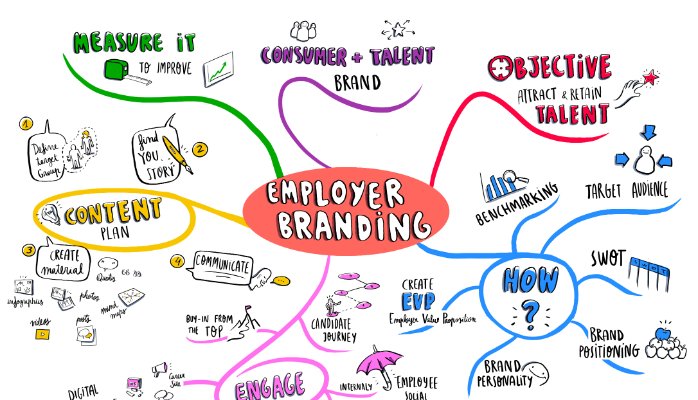Pt 1 of Building a Talent Pipeline For a Fast Recovery in a Post Pandemic World
Part 1 – Employer Branding
Companies not only have to brand themselves for customers these days, but also for potential employees. Employer branding helps with positioning and influences other HR challenges – from recruiting to employee retention. A positive employer image is essential in the “war for talent.” Companies that set themselves apart from their competitors have a better chance of attracting and retaining skilled personnel.
“Employer branding is the effective, identity-based development and positioning of a company as a trustworthy and attractive employer in both its internal and external relationships (…).”
With employer branding, your recruiting is targeted and sustainable, which reduces costs and increases quality. Assume that two companies publish the same job advert on the same portal. The company with the stronger employer brand will receive more applications for the same amount spent – it will have to invest less money in its recruiting funnel to fill a position.
Before a company develops and communicates its employer branding strategy, it should first clearly define its Employer Value Proposition (EVP). Why exactly should applicants be interested in your company? What differentiates you from your competitors? As an employer, what can you expect of your employees? The answers to these questions form the basis for the wording of the EVP and the creation of an employer brand.
Ten years ago, it was primarily the employer that found itself in a privileged situation when selecting suitable employees: Potential candidates were thoroughly screened during the application process, while the employer only revealed little about itself. When the hire was made, the employer knew a lot about the new employee, but the employee knew very little about their future job. What a portfolio is to an applicant, the Employer Value Proposition is to a company. In brief: An employer uses an attractive value proposition to win over talented candidates in the market. Like a good application, an Employer Value Proposition should be both attractive and realistically formulated. Preparing it with great care is therefore absolutely critical. For that reason, a company should heed the following points:
How Do You Define an EVP?
Every successful job application leads to an interview at some point, which is the first personal contact with the company. In order to win the best talent, companies can advertise themselves with attractive value propositions. A well-crafted EVP can help you do that. It sharpens the identity of the employer and strengthens its brand. Developing one requires time, however, and a targeted approach.
Who should be involved in creating the Employer Value Proposition? “Involve everyone that you can’t leave out without being worse off for it”, recommends the industry portal Employerbranding on the question of which groups of people in the company should be involved in creating the EVP. In practice, that means: The project group that drives the creation of the employer brand is in the centre, and if need be, whoever is responsible for HR marketing later. At the kick-off meeting at the very latest, the works council, the management level, and executive management should be involved in creating a basic framework designed for the long term. The EVP is tied to the strategy and culture of the company, and for that reason, employees, HR managers, as well as management must contribute to it.
Definition of EVP target groups:
The effectiveness of an EVP is always directly related to a specific target group. Who do you want to address? This question comes first. We recommend that you develop a higher level, generic EVP, and tailor it to specific groups of employees later on, depending on the positions and departments the new employees are to be recruited for. Candidates for a job at the main office will most likely respond to a different EVP than prospective employees who apply at a branch in the country.
Factors of the Employer Value Proposition
No two EVPs are the same, and the challenge of creating one is working out your strengths as an employer in a credible way. In addition, a company should ask itself the question: What arguments do we have that could really convince a potential applicant to apply for a job with us? These arguments can vary substantially, but here are the most important aspects:
The starting point of the EVP: Compensation.
Compensation is a starting point, which will serve as guidance for the remaining value proposition. It can be set below the market average, oriented to the market, or above it, and depending on its level, arguments outside compensation will be more or less important. A high salary cannot compensate for an awful work environment long term. A company that compensates its employees at or below average needs other unique features to make itself attractive to both established professionals and young talents
Work environment
Prior to Covid 19 one of the most important factors apart from compensation is the work environment. That might include promises like high-quality equipment and furniture, the setup of the office space, beverages and snacks for employees, or even the option to work from home (home office). To someone in a young target group that places a high value on a healthy work-life balance and flexibility, these are important factors. However, since the landscape of the working world has now changed, companies need to invest time and resources into understanding and developing a culture without a workplace.
Corporate culture
A corporate culture that applicants can identify with also plays an important role. That means all of the values a company stands for. Corporate culture can reflect a stance toward human, social or also political issues. To many applicants who are looking for long-term employment, it is important that their employer shares a similar attitude, at least on fundamental issues. At the end of the day, most employees want to be able to go to work with a good conscience.
Career opportunities
How good are the career options and advancement opportunities in the company? The answer to this question can also give your company an advantage. Does the company nurture its employees and their talents? Does it offer free professional training and development? Is it possible to move into a leadership role within a reasonable period of time? Are there positive examples of home-grown talent that have enjoyed long and productive careers? Companies whose HR marketing and Employer Value Proposition show new employees a clear perspective will score points on the job market with high-potential candidates.
Job security
How can an established company compete with young, agile startups? By emphasizing stability and job security, for example. A long history, continuous growth or a leading role in the market give an employee security. The feeling that a job is not at risk from external economic factors can be a crucial criterion for a security-oriented candidate.
Keeping an eye on the competition
Under no circumstances should companies copy from a rival company in putting together their EVP. Doing so prevents you from creating something unique and does not ensure that you address your own target group in the best way. Nevertheless, it is advisable to keep an eye on the value propositions and recruitment marketing activities of direct competitors in order to be able to respond if necessary. If a competitor cannot impress applicants with a good cafeteria, for example, you should place particular emphasis on this value proposition if your company can. Because specific EVP factors such as compensation or specific advancement opportunities are not always openly communicated, you can also employ “undercover” methods and, for example, attend career fairs incognito and search for information on competitors – a common practice in many companies.
Determining the strengths of your own company
The simplest way to find out your own company’s strengths, from an employee perspective, is to simply ask employees directly. Use questionnaires or qualitative interviews, for example, to gain important insights. Your questions should focus on why an employee decided on the company, why they still like to work there, and why they would recommend their employer to a friend.
Once you have defined the target groups, analysed your own strengths from an internal and external perspective, and included your competitors’ weaknesses, a final EVP needs to be formulated. Companies should orient themselves around certain basic rules. The more individually the EVP is formulated, the more credible and strongly formulated it is. Companies should therefore absolutely refrain from generic expressions like “good career opportunities” or “wide-ranging tasks”. Applicants have heard and read these things over and over, and they sound meaningless and uninspiring. Employers should therefore proceed carefully and avoid generic arguments. Stringing together self-praise ad nauseam comes across as less believable than a detailed description using just a few arguments that really connect.
In the end, what counts with the EVP is honesty and a realistic view of your company. Employees who are disappointed by broken promises can act as negative multipliers and do a lot of damage to the employer brand. A well-conceived EVP supports employee recruiting, retention and motivation.
What are your values? What are your employees’ and candidates’ values?
The more overlap there is, the better. Use research and target group interviews to collect information and create candidate personas.

Next Week: How to Create Candidate Personas
With thanks to Personio.


